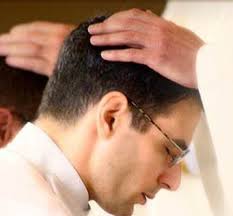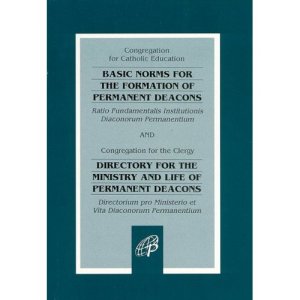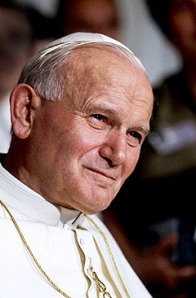 From the inbox comes a note from a very concerned brother deacon. A priest recently told him that there was no real sacramental significance to being a deacon, unlike the ordinations of presbyters or bishops, which change a person at the very core of their being. As another deacon once remarked to me after a Conference, a priest once told him that “being a deacon is not a REAL vocation, like being a priest or a religious.” I have heard both of these observations before, and want to reassure my brother deacons that, contrary to the mistaken opinions of some of the priests involved (and others, of course): being a deacon IS a real vocation, and our ordination is just as “sacramentally effective and significant” as any other ordination to the other orders that make up the Sacrament of Holy Orders!
From the inbox comes a note from a very concerned brother deacon. A priest recently told him that there was no real sacramental significance to being a deacon, unlike the ordinations of presbyters or bishops, which change a person at the very core of their being. As another deacon once remarked to me after a Conference, a priest once told him that “being a deacon is not a REAL vocation, like being a priest or a religious.” I have heard both of these observations before, and want to reassure my brother deacons that, contrary to the mistaken opinions of some of the priests involved (and others, of course): being a deacon IS a real vocation, and our ordination is just as “sacramentally effective and significant” as any other ordination to the other orders that make up the Sacrament of Holy Orders!What’s going on here? Why is there such confusion about this? Let me suggest a few answers. Perhaps this could be part of a conversation and ongoing formation offered to our seminarians and priests (and it wouldn’t hurt for deacons and lay folks to remember it, too!).
1) A “theology of the diaconate” is only just now being developed. This may seem surprising, but when you think about it, it makes sense. For about a millennium or so, “being ordained” was usually summed up in (reduced to?) reflections on “being a priest.” That was the order that mattered the most, since this was the order (of presbyters) who “confected the Eucharist”, and all other orders were preliminary to, and led to, the presbyterate. For quite a while, even being a bishop was understood primarily through the lens of the priesthood, with the responsibilities of being a bishop understood primarily as a matter of jurisdiction, not sacramental significance. This point of view was overturned at the Second Vatican Council, which restored a more ancient understanding of Orders, first by reclaiming the more ancient theological understandings of the episcopate (see Lumen gentium, ##18-27), returning the diaconate to an order to be exercised permanently, and by authorizing the restructuring of the entire Sacrament of Holy Orders; Pope Paul VI implemented those decisions between 1967 (when he adjusted canon law to permit the ordination of “permanent” deacons) and 1972 (when he suppressed, in the Latin Church, first tonsure, the minor orders of porter, lector, exorcist and acolyte, and the subdiaconate; he concurrently authorized LAY ministries of lector and acolyte, no longer to be ordinations, but lay institutions). This means, vis-a-vis the diaconate, that for the first time in more than a millennium, a person could be ordained to a major and permanent order of the ministry (the diaconate) without eventually seeking ordination to the presbyterate. Therefore, given the large scale absence of “permanent” deacons for so long, there was no proper theology of the diaconate-qua-diaconate.
The Holy See recognized this in a 1998 document from the Congregation for Catholic Education (#3):

The almost total disappearance of the permanent diaconate from the Church of the West for more than a millennium has certainly made it more difficult to understand the profound reality of this ministry. However, it cannot be said for that reason that the theology of the diaconate has no authoritative points of reference, completely at the mercy of different theological opinions. There are points of reference, and they are very clear, even if they need to be developed and deepened.So, what are these “points of reference” offered by the Holy See?
A. First of all we must consider the diaconate, like every other Christian identity, from within the Church which is understood as a mystery of Trinitarian communion in missionary tension. This is a necessary, even if not the first, reference in the definition of the identity of every ordained minister insofar as its full truth consists in being a specific participation in and representation of the ministry of Christ. This is why the deacon receives the laying on of hands and is sustained by a specific sacramental grace which inserts him into the sacrament of Orders.
B. The diaconate is conferred through a special outpouring of the Spirit (ordination), which brings about in the one who receives it a specific conformation to Christ, Lord and servant of all. Quoting a text of the Constitutiones Ecclesiae Aegypticae, Lumen gentium (n. 29) defines the laying on of hands on the deacon as being not “ad sacerdotium sed ad ministerium”,(6) that is, not for the celebration of the eucharist, but for service. This indication, together with the admonition of Saint Polycarp, also taken up again by Lumen gentium, n. 29,(7) outlines the specific theological identity of the deacon: as a participation in the one ecclesiastical ministry, he is a specific sacramental sign, in the Church, of Christ the servant. His role is to “express the needs and desires of the Christian communities” and to be “a driving force for service, or diakonia”, which is an essential part of the mission of the Church.
C. The matter of diaconal ordination is the laying on of the hands of the Bishop; the form is constituted by the words of the prayer of ordination, which is expressed in the three moments of anamnesis, epiclesis and intercession. . . . [NOTE: The matter and form of the diaconate, presbyterate and episcopate were clarified and promulgated by Pope Pius XII in his 1947 Sacramentum Ordinis. One would hope that by now this document would have found its way into seminary curricula! ]
D. Insofar as it is a grade of holy orders, the diaconate imprints a character and communicates a specific sacramental grace. The diaconal character is the configurative and distinguishing sign indelibly impressed in the soul, which configures the one ordained to Christ, who made himself the deacon or servant of all. It brings with it a specific sacramental grace, which is strength, vigor specialis, a gift for living the new reality wrought by the sacrament. “With regard to deacons, ‘strengthened by sacramental grace they are dedicated to the People of God, in conjunction with the bishop and his body of priests, in the service (diakonia) of the liturgy, of the Gospel and of works of charity’”. Just as in all sacraments which imprint character, grace has a permanent virtuality [The Latin original has: Sicut in omnibus sacramentis characterem imprimentibus, gratia permanentem virtualem vim continet]. It flowers again and again in the same measure in which it is received and accepted again and again in faith.
E. In the exercise of their power, deacons, since they share in a lower grade of ecclesiastical ministry, necessarily depend on the Bishops, who have the fullness of the sacrament of orders. In addition, they are placed in a special relationship with the priests, in communion with whom they are called to serve the People of God.
F. From the point of view of discipline, with diaconal ordination, the deacon is incardinated into a particular Church or personal prelature to whose service he has been admitted, or else, as a cleric, into a religious institute of consecrated life or a clerical society of apostolic life.(13) Incardination does not represent something which is more or less accidental, but is characteristically a constant bond of service to a concrete portion of the People of God. This entails ecclesial membership at the juridical, affective and spiritual level and the obligation of ministerial service.
 2. If this were not enough to demonstrate the proper character of a vocation to the diaconate, consider the words of soon-to-be Saint John Paul II, who offered a series of catecheses on the diaconate in 1993. He observed with great clarity a theme he would make several times during his papacy:
2. If this were not enough to demonstrate the proper character of a vocation to the diaconate, consider the words of soon-to-be Saint John Paul II, who offered a series of catecheses on the diaconate in 1993. He observed with great clarity a theme he would make several times during his papacy:The exercise of the diaconal ministry—like that of other ministries in the Church—requires per se of all deacons, celibate or married, a spiritual attitude of total dedication. Although in certain cases it is necessary to make the ministry of the diaconate compatible with other obligations, to think of oneself and to act in practice as a ‘part-time deacon’ would make no sense. The deacon is not a part-time employee or ecclesiastical official, but a minister of the Church. His is not a profession, but a mission!So, why does any confusion persist on this matter? Let me offer a couple of suggestions.
3. The sacramental question of HOW the deacon participates in the one Sacrament of Holy Orders has developed since the release of the documents on the diaconate in 1998. Following some initial changes to the Latin editio typica of the Catechism of the Catholic Church back in 1994, Pope Benedict in 2009 issued motu proprio Omnium et Mentem. In this document, canon law (specifically cc. 1008 and 1009) was changed to reflect that only presbyters and bishops act in persona Christi Capitis (“in the person of Christ, the Head of the Church”), while deacons serve in a ministry of word, sacrament and charity. This distinction, however, does not — and should not — be taken to suggest that deacons are no less ORDAINED into sacred ministry (which is the point of the canons on this point!) or that our ordination is no less sacramentally significant. The canons simply reflect a theological position that there are two modalities of participation in the ONE Sacrament of Holy Orders. [Here's an interesting side note: the change to canon law only affected the Code of Canon Law for the Latin Church; the Code of Canons for the Eastern Catholic Churches does not use the language of in persona Christi Capitis, so the distinction did not need to be made there.]
4. I think that, since the Council, there has been legitimate concern on the part of many presbyters that the specific nature of the presbyterate has been under assault. One bishop who participated in all four sessions of the Council as a young bishop, once remarked to me that he considered it a great shortcoming of the Council that they did not spend more time on the nature of the priesthood itself. “After all,” this bishop said, “We spent considerable time talking about the sacramental nature of the episcopate, and we developed wonderful texts on the nature and role of the laity. We even renewed the diaconate! But we did not take into proper account the profound impact all of that would have on the presbyterate itself.” As a result, many of the functions which had become part of the presbyterate prior to the Council now began to be disbursed to other ministers, both lay and, now, deacons. This means that there is a certain concern that the presbyterate itself is being somehow “eroded” as others assume their own rightful and legitimate places in ministry, both within the Church and in the world.
But the bottom line remains:

Deacons are ordained, and are permanently changed in the core of our being by that ordination (what we used to call in days gone by as “ontologically changed”). We are always and everywhere full-time ministers, as St. John Paul II so passionately proclaimed, even when that ministry occurs outside the normal institutional structures of the Church. During those same catecheses in 1993, John Paul II also reminded people that “a deeply felt need in the decision to re-establish the permanent diaconate was and is that of greater and more direct presence of Church ministers in the various spheres of the family, work, school, etc., in addition to existing pastoral structures.” The diaconate is a sacrament and a proper vocation. It is perhaps also a useful reminder to many of our sisters and brothers that we are all gifted with many “proper vocations” — calls from God! — in our lifetimes. Our baptisms themselves constitute our primal vocation, before all others, for example! Some of us are called to religious life, some are called to matrimony, some are called to Orders, and some of us are called to several of these at the same time! Our God is a most generous God, and attempts to characterize one vocation over against another is to deny that divine generosity and to misunderstand the nature of vocation in the first place.
Now, let us all go out and serve one another!
No comments:
Post a Comment